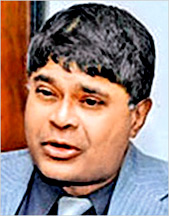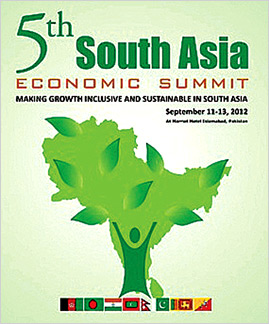‘Enhancing S. Asia’s principal asset - its people’
Text of an inaugural presentation by Prof.
Rajiva Wijesinha, MP at the Fifth South Asia Economic Summit on ‘Making
growth inclusive and sustainable in South Asia,’ Islamabad, September
11, 2012
|

Prof. Rajiva Wijesinha, MP
|
I am grateful to the Sustainable Development Policy Institute of
Pakistan for inviting me to this Summit, and giving me an opportunity to
discuss its theme in relation to Sri Lanka. As you are aware, Sri Lanka
recently came out of decades of conflict which had impaired economic
development, and in particular the promotion of equity in such
development.
Comparatively speaking Sri Lanka in fact did reasonably well with
regard to growth, except when there were grave problems, as in 2001.
However that growth was lopsided, with almost all the increase in wealth
that has propelled us upward from being a low income country into middle
income status occurring in the Western Province. Since it was such
lopsided development that contributed to a series of youth insurrections
in the last four decades, it is vital that we correct this imbalance if
we are not to face further disruptive unrest in the future.
Two of those insurrections were by Sinhalese youngsters in the South
of the country, which indicates that the neglect from which the majority
Tamil Northern province and the majority Tamil speaking Eastern province
suffered was not deliberate. However, in a context in which decisions
are made through a majoritarian system of government, it is
understandable that shortcomings as to developmental activity were
attributed to racism. It is vital therefore that government not only
ensures positive developments in the North and East, as well as in other
previously neglected regions, but takes steps to institutionalize these
by ensuring decision making processes that respond rapidly, not only to
people’s needs, but also to their aspirations.
Development process
I should note that this is being attempted, not least I suspect
because the present Head of Government in Sri Lanka is the first elected
leader who is not from the Western Province. Obviously such origins are
not a requirement for commitment to rural development, and we have had I
think three leaders in the past who devoted a lot of time and energy to
promoting equity. But their perspectives were limited by a centralized
vision, so that there was inadequate attention to promoting local
participation in the development process.
 Nowhere is this more apparent than in an area you have highlighted in
your Concept Paper, namely that ‘inequality in education continues to
keep societies poor’. There was a valiant attempt by a visionary
Minister of Education in the thirties - when the British ran what they
thought were the important departments of government, but had allowed us
executive power in some areas - to develop centres of excellence in what
then seemed regional hubs. But no effort was made to expand these as the
demand for education grew, and indeed the quality of the service they
provided declined in comparison to what is available in Colombo and a
couple of other major towns. Nowhere is this more apparent than in an area you have highlighted in
your Concept Paper, namely that ‘inequality in education continues to
keep societies poor’. There was a valiant attempt by a visionary
Minister of Education in the thirties - when the British ran what they
thought were the important departments of government, but had allowed us
executive power in some areas - to develop centres of excellence in what
then seemed regional hubs. But no effort was made to expand these as the
demand for education grew, and indeed the quality of the service they
provided declined in comparison to what is available in Colombo and a
couple of other major towns.
With regard to universities, moving out of Colombo and Kandy did not
happen for 25 years after independence, in contrast for instance with
the brilliant idea of Institutes of Technology which India set up
promptly all over that country. By the time we set up universities in
every province, a process which was completed just a decade back, the
staff and the courses these new institutions could offer were stuck in a
time warp that precluded job-oriented training. In short we were stuck
with the old exclusive British model of tertiary education, which the
British have themselves long abandoned.
We have also suffered immensely from a statist approach to education.
When, through the government elected in 1977, we moved together with
several other countries out of the command economy model which our
politicians who came to maturity in the thirties had absorbed, we
privatized mainly the business sector. Allowing private or non-profit
agencies to work in education was considered taboo, though interestingly
enough this has been permitted in the health sector, which continues to
flourish. While we were distinguished in South Asia 50 years ago for our
excellent health and education indicators, we still continue to provide
better services than I think all the rest in health. In education,
though our literacy and schooling figures are still comparatively
excellent, we have rested on our laurels, and produce nothing at the top
end of the scale that can compare with what other South Asian countries
have achieved.
After the commitment of both state and the private non-profit sector
to supply a good education turned into the establishment of a state
monopoly, a rot set in.
Good harvest
The state simply could not supply enough, and maintain high quality,
so we now have the ludicrous situation of additional supply being
provided by international schools and by tutories. Unfortunately our
doctrinaire statists object to the former, and allow the latter full
rein, even though they disrupt the school system even more
destructively, given that many school teachers give tuition and expect
their students to come to their classes to get what is not given in
school.
Vested interests thus prevent the radical reforms that are required.
Fortunately perhaps, the situation has declined so dramatically that
there is a general consensus now that change is essential, and this
theme has now been taken up by urban interest groups too. The quiet
sustained suffering of rural areas will therefore I hope be alleviated
soon. Certainly, at the Divisional level Reconciliation Committees I
have set up in the North and East, complaints about education form a
high proportion of the complaints made and contribute to continuing
resentments, which it would be so easy to overcome.
Two specific complaints highlight the problem. The first, pervasive
at all meetings, is the shortage of teachers for English and Science and
Maths. I explain that this is true nationwide, but I can understand the
point of view of Tamil communities that, if successive governments have
failed to deal with this problem for six decades, those who did not vote
for any of them should be given a chance to develop their own systems.
Better still would be for government to abandon its monolithic hold
on teacher training, and allow other suppliers to move in and perhaps do
better than government does, in terms of quality as well as outreach.
But government continues to stick to methods that have failed
repeatedly, with each successive Minister of Education implying that he
will achieve what his predecessors failed to do, without understanding
that such protracted failure indicates that the system is at fault, not
everyone else who has gone before.
We continue then to let our people down, since, as your Concept Paper
puts it, ‘plan and policy formulators still have not given due
importance to social capital’. This is apparent, and perhaps more
upsettingly so, in another area brought to my attention, when a
representative of a Women’s Rural Development Society in a remote
Division in the North told me that they needed training in marketing.
The population was generally appreciative of what government had done to
get agriculture going again so swiftly in areas ravaged by war, the mine
clearing, the irrigation work and the road building to improve
connectivity that I believe we did more quickly than any other country
that had suffered from such a conflict. But we did not do enough to
ensure that the perennial problem of our farmers, exploitation by
middlemen who pay them little and then make huge profits on a good
harvest, was overcome.
Communication skills
Modern farming communities need training, in marketing and value
addition, which requires better numeracy and communication skills as
well as technical support. We have to do much more in this regard if the
immense infrastructural input we have supplied is to lead to rural
communities being benefited as they deserve.
Unfortunately we have not moved as swiftly as we should with the high
level technical and vocational training that is needed.
Our universities still cling to outdated notions of academic
excellence, and even the Vocational and Technical University that was
set up to overcome this problem has not developed courses that also
provide soft skills that could, on a modular basis, allow technicians to
obtain degrees.
Students have often to travel miles to follow courses in wiring and
plumbing, which means that outsiders often get jobs in the construction
work that government and other agencies have engaged in at prolific
levels to build up the region.
Three years ago, when the reconstruction began, we failed to plan
comprehensively, and in particular to work on developing human capital.
Perhaps we thought that, as had happened in the East, the development of
infrastructure and connectivity would stimulate business activity and
promote prosperity for all. But, though that worked satisfactorily
enough, and the East is certainly a much more prosperous area than
previously, we have not done enough to ensure productive employment for
younger generations that now have enhanced expectations. And in the war
torn areas of the North, where human resources development did not take
place to any appreciable extent, given the practice of the LTTE of
treating all youngsters, except for a selected elite few, as cannon
fodder, we should have seen the need for much concerted effort.
What the last few decades have taught us emphatically is that the
trickle down effect does not take place in less developed societies (and
I suspect elsewhere too, though it might be masked better there),
without state intervention and support to promote equity. For this
purpose education and training has to be modern and comprehensive, with
careful attention to the soft skills, of communication and
inter-personal relations and general awareness that are essential for
employment anywhere and everywhere in the world. Initiative,
entrepreneurship, management, presentation skills, should all be made
available.
At a recent workshop of Globalization I recall Senator Pimentel of
the Philippines pointing out how the West was anxious for free trade of
goods and services and finances, but resolutely opposed the free
movement of labour. He noted that they pushed globalization with regard
to what they were good at, and suggested that we should question this,
and push for globalization of what we are good at, namely people.
I believe that we should promote that as policy for all our
governments, but we should also ensure that governments serve that great
asset better, by enhancing knowledge and skills and capacities as best
possible. Without that growth will not be inclusive, and it certainly
will not be sustained.
|





